by pmdavis | Oct 24, 2024

Recycled Art Ideas
I have the privilege of writing about our last class in the 4-H Division-CLASS 18: Recycled Arts for North Florida Fair. For this class you will create an original piece using recycled or natural products. The art can be 2-dimensional, 3-dimensional. At least half of the final piece should be from recycled (something that is used differently than its original purpose like: plastics, aluminum cans newspapers, cardboard, etc) or a natural environmental material, such as pinecones, dried flowers, leaves, or sticks. All materials used must be clean, sanitary, and safe.
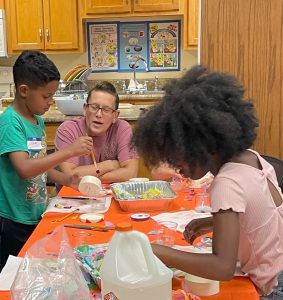
Learning by doing
So, if you use something that previously contained food it must be washed. If the item is from the environment remove excess dirt from the natural materials. Finally, all sharp edges on the artwork should be removed or covered for safety.
Preparing your Entry Form & Exhibitor’s Tag
You will need to have their entry forms to your 4-H Office by the 1st of October. 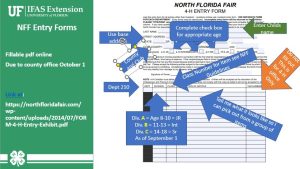
When you turn in your entry form, your 4-H agent will assign exhibit tags, which you will need to fill out and attach to your plant when it is time to submit for judging. Here is the information you need to correctly complete your entry tag:
- Section – 210
- Class- 18
- Lot- This will be your age division; write “A” for juniors (8-10 years old), “B” for intermediates (11-13 years old), or “C” for seniors (14-18 years old).
- Exhibit- a short description of the item you are entering (example: recycled pop bottle to piggy bank)
- Exhibitor- Your name
- Address- Name of your county
You can have up to 6 recycled art entries for the North Florida Fair. Youth will need to attach a label with a description of recycled material to their exhibit. The fantastic thing about this class is everyone can be creative, and this is a relatively inexpensive hobby that helps the environment by lowering the amount of items going into landfills. Take some time relax and be creative to create your recycled art fair exhibits.
Scoring
You can download the judges’ scoring rubric for more information on how recycled art entries are judged. These entries are evaluated on:
Materials
- 50% made from recycled or natural materials.
- Description identifying recycled materials attached to item.
- Item is a two- or three-dimensional piece of art from previously used materials.
- The completed art piece is different from its original use.
Designs and Creativity
- Workmanship/technique/materials – overall composition was planned filling space adequately.
- Neatness/appearance – care was taken in the creation of the item.
- Appropriate combination or use of materials.
- Recycled items are clean, sanitary, and safe.
- Creativity – item is unique or original.
- Creative use of color, pattern, or material.
After judging, a ribbon will be attached to your plant, and the ribbon color will be recorded for the fair office so they can issue you your premium money. 4-H Day at the Fair (November 16) is a great time to check to see what placings your exhibits earned!
Take a little time today to relax and create your own recycled art project for the fair. If you have questions, reach out to your local UF IFAS Extension Office.
Resources:
North Florida Fair 4-H Club Department 210 Rules
4-H Entry Form (for non-animal exhibits such as Recycled Arts)
Class 18 Recycled Arts
4-H Mall Visual and Creative Arts Curriculum
by lauenc | Oct 7, 2024
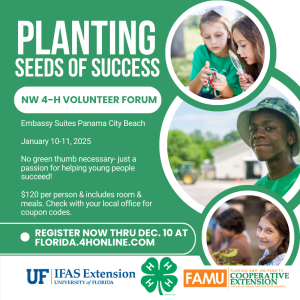 Dates: January 10-11, 2025
Dates: January 10-11, 2025
Location: Panama City Beach, FL
Are you excited about helping young people grow? Do you want to become a stronger leader and connect with others who share your passion? Then save the date for the Northwest 4-H Volunteer Forum in Panama City Beach! We’re looking forward to a weekend filled with learning, fun, and connection. This forum is a great chance for 4-H volunteers to gain new skills, share ideas, and make an even bigger impact on the youth we serve.
Volunteers are the heart of 4-H. You play a vital role in mentoring young people and helping them grow in projects like agriculture, science, health, and citizenship. Without your time and dedication, 4-H wouldn’t be able to fulfill its mission to empower and guide the next generation.
One of the best parts of attending the forum is the chance to network with fellow volunteers. Connecting with others who share your passion for 4-H opens the door to collaboration and learning from each other’s experiences. By building communities of practice, we strengthen our local programs and create lasting partnerships that help us serve youth more effectively. These connections can lead to new ideas, shared resources, and ongoing support from others who understand the challenges and rewards of volunteering.
At the forum, you’ll have the chance to attend workshops designed to strengthen leadership, build new programs, and provide helpful tips for mentoring youth. These sessions will be led by experienced 4-H Agents and volunteers who can’t wait to share their insights. You’ll leave with fresh ideas and skills to take back to your 4-H community, helping to make an even bigger difference.
Register today to be part of this exciting opportunity! Not only will you grow as a leader, but you’ll also contribute to the success of 4-H for years to come. Let’s work together to inspire the next generation of leaders and problem-solvers. Don’t miss out—come grow, connect, and lead with us!
Feel free to share this invitation with other volunteers or anyone interested in supporting 4-H. Let’s grow together!
Register in 4Honline now through December 10th.
by pmdavis | Aug 28, 2024

Horticulture Class Display
It’s hard to believe fair season is just around the corner. I remember as a youth the excitement of entering my projects in the county fair. Today I will be sharing tips for preparing your plant project for exhibition at the fair. At the North Florida Fair, youth plant projects are entered in Class 1 of department 210. This includes plants grown in containers or dish gardens, and each youth can enter up to six entries for this class. Youth need to have their plants six weeks prior to the fair; this year that is around September 15. If you are growing your plant from seed or from a cutting, you will want to start much earlier. The exact time will depend on the type of plant you are growing.
You want to select plants that will peak in November or that can be maintained at a good size for exhibit. Here’s a list of plants that have been exhibited in past years, and work well for this time of year in Florida: African Violet, Aloe, Aluminum, Angelonia, Arrowhead Plant, Basil, Begonia, Blue Daze, Cardinal guard/Mexican Firebush, Coleus, Christmas Cactus, Cilantro, Creeping Jenny, Croton, Cuban Oregano, Dianthus, Dieffenbachia, Dracaena, Crossandra, Jade Plant, Ferns, Fittonia, Ghost Plant, Kalanchoe, Lavender, Liriope, Perilla, Euonymus, Marigold, Moss Rose (Portulaca), Impatiens, Marjoram, Mums, Oregano, Oyster Plant, Orchid, Parsley, Pentas, Peace Lily, Ornamental Peppers, Pentas, Peperomia, Persian Shield, Petunia, Philodendron, Pilea, Polka Dot Plant, Portulaca, Pothos, Prayer Plant, Purple Heart, Rosemary, Sage, Salvia, Sedum, Spider Plant, Snake Plant, Stevia, Tarragon, Thyme, Torenia, Vinca, Wax Begonia, Zinnia.
Caring for your Plant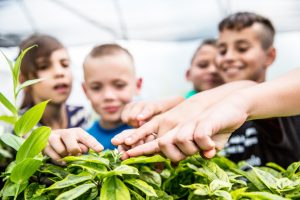
The fantastic thing about exhibiting plants is everyone can grow flowers and vegetables in small spaces using containers. It is also a relatively inexpensive hobby that helps the environment. The main requirement is that you grow plants together with similar light and moisture requirements. Here are a couple of resources to assist you with container gardening from Florida and Iowa.
Plants for exhibition should have good spread, fullness, and height. Branching is often more desirable than extra height. That may mean that the plant needs to be cut back to allow branching and encourage symmetrical growth. A one-sided or unevenly developed plant often indicates that it has not been rotated regularly and has grown toward the sun or source of light.
First decide where your plant will be kept. Is it sunny or shady? Will it get lots of water or a little water? Next select the plants that will meet the location needs. Then find a container to show off your plants for the fair. You want your pot to be in proportion to the plants you planted. You do not want the container to be unstable or overpowering. In our county, we use gallon size black pots for the ease of transport to the fair. However, the fair does not limit or specify the type of container to be used. Talk with your local extension faculty if they are transporting your plants for you since they may have limitations on what they can transport. The biggest thing to remember is the plants are the stars of the show and need to be the eyecatcher, not the container outshining the plants.
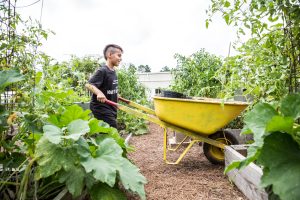 Prepping Your Plant for Exhibition
Prepping Your Plant for Exhibition
After having your plants for six weeks your will need to do a few things to get them ready for exhibit at the fair. Download this checklist to help you prepare!
- You will want to have a saucer to catch water drainage.
- Next clean your pot by removing soil and spray residue from the sides. Remove any excess roots coming out of the bottom of the container. Groom your plant by remove any detritus (dead leaves, sticks etc.) laying on top of the soil. You may need to top dress the container with fresh soil or compost to make it neat in appearance.
- When grooming the plants you want to remove all soil and spray residue from the foliage, stems, and flowers. You can do this by using a damp cloth or soft brush. Be careful not to damage the foliage or petals when doing this step. Next you want to look at the plant for faded blooms, ragged leaves and dead or diseased branches. These should be removed, or trimmed (following the natural shape of the leaf) but stubs or wounds may be noticed by the judge so avoid removing too many leaves and stems.
- If your plant needs to be staked to stand up correctly, stake it but the stake should end below the plant. You want the stake to be as unobtrusive as possible.
- Finally, attach the fair entry tag to your container. Make sure to include the container start date and common plant names to the entry tag or use another label.
Preparing your Entry Form & Exhibitor’s Tag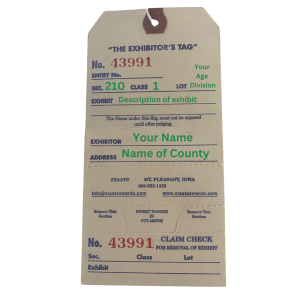
Entry forms are due to your local 4-H Extension Office by the 1st of October. When you turn in your entry form, your 4-H agent will assign exhibit tags, which you will need to fill out and attach to your plant when it is time to submit for judging. Here is the information you need to correctly complete your entry tag:
- Section – 210
- Class- 1
- Lot- This will be your age division; write “A” for juniors (8-10 years old), “B” for intermediates (11-13 years old), or “C” for seniors (14-18 years old).
- Exhibit- a short description of the item you are entering (example: dwarf coreopsis)
- Exhibitor- Your name
- Address- Name of your county
Scoring
Your plant will be judged the Wednesday before the fair opens. Foliage plants are judged on the quality and appearance of leaves and stems. Colors should be bright, clear, and typical of the plant. Flowering plants are judged for their display of flowers but should not show obvious foliage (leaf) damage. A comparison of the number of open flowers and buds is typically used to evaluate similar entries. You can download the judges’ scoring rubric for more information on how horticulture entries are judged. After judging, a ribbon will be attached to your plant, and the ribbon color will be recorded for the fair office so they can issue you your premium money. 4-H Day at the Fair (November 16) is a great time to check to see what placings your exhibits earned!
Take a little time today to dig in the dirt and create your own container garden(s) for fair exhibits. If you have questions, reach out to your local UF IFAS Extension Office.
Resources:
by Valerie Mendez Stansly | Aug 23, 2024
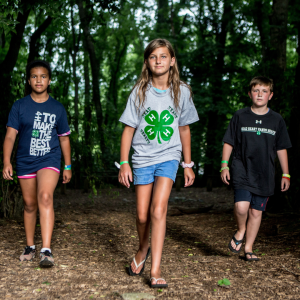 Every fall, as the North Florida Fair rolls into Tallahassee, 4-H members eagerly anticipate 4-H Day, a special day filled with excitement beyond the usual fair food and rides. This annual event offers 4-H participants a chance to dive into a range of contests and activities, with one of the highlights being the Wildlife Ecology contest. During this competition, young people get the opportunity to test their knowledge and skills by identifying various forest trees and wildlife, making it a fantastic blend of fun and learning.
Every fall, as the North Florida Fair rolls into Tallahassee, 4-H members eagerly anticipate 4-H Day, a special day filled with excitement beyond the usual fair food and rides. This annual event offers 4-H participants a chance to dive into a range of contests and activities, with one of the highlights being the Wildlife Ecology contest. During this competition, young people get the opportunity to test their knowledge and skills by identifying various forest trees and wildlife, making it a fantastic blend of fun and learning.
The Contest
The 4-H Wildlife Judging Contest is a showcase of both individual and team talents. All youth ages 8-18 can participate as individual competitors. Participants from the same county can also be organized into teams of 3 or 4, and compete at Junior, Intermediate, and Senior levels based on age. At the end of the contest, the scores from the top three team members are combined to determine the team’s overall performance.
The contest is divided into various stations, each focusing on different aspects of wildlife and forest ecology. Three main topics covered during the fall contest are:
- Trees
- Mammals
- Birds, Reptiles, and Amphibians
Beyond the Contest
The 4-H Wildlife Judging Contest is much more than a competitive event; it’s a platform for essential life skill development. Preparation for and participation in the contest teach youth valuable lessons beyond academic knowledge of Florida’s ecology:
- Critical Thinking: Evaluating plants and wildlife involves using what youth know to make smart decisions. They have to consider various details, like the characteristics of different species and their role in the environment in order to properly identify the plant or animal species. This hands-on approach helps youth develop better problem-solving skills and feel more confident in their decision-making.
- Teamwork and Leadership: The contest encourages students to work together, which helps them learn how to communicate and support each other effectively. They also get a chance to take on leadership roles, guiding their team and making sure younger members understand the subject matter during preparation meetings. These experiences helps youth build important skills for working well with others in school and in their future careers.
- Dedication and Perseverance: Preparing for the contest takes a lot of hard work and commitment, as youth need to study and practice regularly. This process teaches them the value of persistence and dedication, which are important for achieving success in any area of life. The skills they develop through this effort can help them tackle challenges and stay focused on their goals.
Starting a Wildlife Ecology Club
If the opportunities offered by the 4-H Wildlife Judging Contest has inspired you, starting a Wildlife Ecology Club at your school or community center is a great way to engage more youth in environmental education. These clubs are wonderful way of integrating various age groups and skill levels, allowing members to work both independently and collaboratively. Inviting special speakers such as extension agents, foresters, and rangers can introduce youth to meaningful careers in forestry and wildlife conservation. In addition to club meetings, monthly hikes can provide hands-on experience, allowing kids to explore the outdoors while refining their identification skills.
Your local county 4-H agent and staff are the greatest resource on how you could get started in your area. Many counties in Florida already boast 4-H community clubs dedicated to wildlife and forest ecology that you can volunteer or meet to shadow before starting your own club. In addition, the Florida 4-H Forest Ecology page offers a wealth of information regarding the annual statewide and national Forest Ecology Contest that is held each spring.
Conclusion
The 4-H Wildlife Judging Contest at the North Florida Fair exemplifies the intersection of competition and education, offering a dynamic platform for youth to deepen their understanding of Florida’s forests and wildlife. Beyond the competition, the skills and experiences gained through participation are invaluable, preparing young individuals for future challenges and opportunities. Whether through participating or starting a new club, engaging with Florida’s wildlife and ecology fosters a lifelong appreciation for the natural world and equips youth with essential life skills.
by lauenc | Aug 6, 2024
2024 4-H Northwest District Tailgating (Grilling) Contest Results
The 2024 4-H Northwest District Tailgating (Grilling) Contest was a great success and served as a platform to showcase the grilling talents of youth from various counties. This event is part of the broader Florida 4-H Tailgating Contest program, that aims to promote the safe preparation of animal proteins and develop valuable life skills in youth. The 2024 Florida 4-H District and State Contests are sponsored by Publix Super Markets and Sonny’s BBQ.
Program Overview
The Florida 4-H Tailgating Contest encourages participants to grill different types of proteins, including beef, pork, poultry, and shrimp. Youth compete at county and district levels, with top performers advancing to the state competition. The Contest also requires participants to create a tabletop display to show off their recipe and creativity. Participants may use a laptop/iPad/poster & easel to complement their tabletop display to describe their recipe. The overall program emphasizes the development of grilling skills, highlights food and fire safety, and promotes healthy lifestyle choices.
2024 CONTEST RESULTS
Beef Category
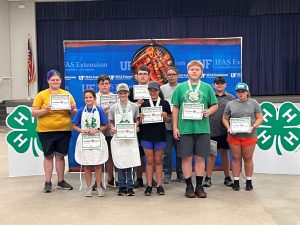
- 1st Place: Cate B. (Okaloosa)
- 2nd Place: Jade L. (Liberty)
- 3rd Place: Sydney G. (Escambia)
- 4th Place: Charlie B. (Gadsden)
Pork Category
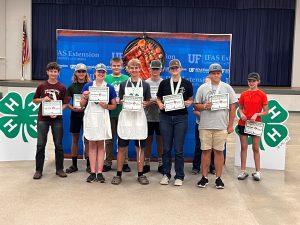
- 1st Place: Taylor A. (Escambia)
- 2nd Place: Josh W. (Washington)
- 3rd Place: Brogan B. (Holmes)
- 4th Place: Malec C. (Liberty)
Chicken Category
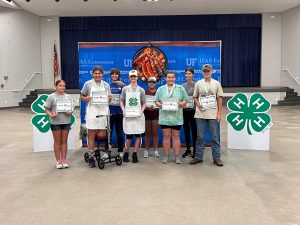
- 1st Place: Tucker P. (Escambia)
- 2nd Place: Braden P. (Escambia)
- 3rd Place: Kylie T. (Bay)
- 4th Place: Emmit A. (Holmes)
Shrimp Category
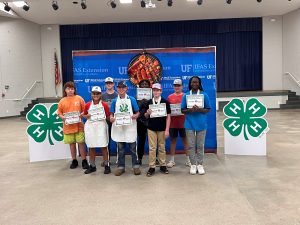
- 1st Place: Chipper M. (Holmes)
- 2nd Place: Jeb W. (Gadsden)
- 3rd Place: Hunter S. (Escambia)
- 4th Place: Cheyanne H. (Gadsden)
Prizes
Winners in each category were awarded as follows:
- 1st Place: $400
- 2nd Place: $250
- 3rd Place: $100
- 4th Place: $50
State Competition
The top two winners from each category will advance to the Florida 4-H Tailgating State Contest on October 5, 2024, at the Animal Sciences Beef Teaching Unit in Gainesville, FL. Participants will have the opportunity to compete for further recognition and scholarships.
State Contest
For each protein category:
- 1st Place: $1,500
- 2nd Place: $1,000
The Florida 4-H Tailgating Contest not only provides a competitive platform but also equips youth with essential life skills, fostering a healthy lifestyle and decision-making abilities (Florida 4-H) (UF IFAS Extension). For more information about the District Contests and the State Contest, contact your local 4-H Agent and visit Tailgate Contest – Florida 4-H – University of Florida, Institute of Food and Agricultural Sciences – UF/IFAS (ufl.edu).













